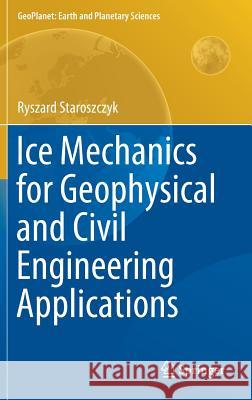Ice Mechanics for Geophysical and Civil Engineering Applications » książka
topmenu
Ice Mechanics for Geophysical and Civil Engineering Applications
ISBN-13: 9783030030377 / Angielski / Twarda / 2019 / 334 str.
Kategorie BISAC:
Wydawca:
Springer
Seria wydawnicza:
Język:
Angielski
ISBN-13:
9783030030377
Rok wydania:
2019
Wydanie:
2019
Ilość stron:
334
Waga:
0.69 kg
Wymiary:
23.5 x 15.5
Oprawa:
Twarda
Wolumenów:
01
Dodatkowe informacje:
Wydanie ilustrowane











